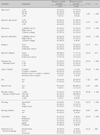Abstract
Purpose
The purpose of this study was to compare the levels of stress, social support, and marital satisfaction between married immigrant women living in urban areas and women living in rural areas to identify ways to improve their mental health.
Methods
Two hundred married immigrant women were recruited from multicultural family-support centers located in Daejeon City and Chungcheong Province. From July, 2009 to January, 2010, data were collected using self-administered questionnaire. Study instruments were scales for acculturative stress, housewives life stress, support from spouse, and marital satisfaction.
Results
Urban married immigrant women had lower levels of acculturative stress and higher levels of support from spouse and more positive marital satisfaction compared to rural women. Both groups reported similar levels of stress in life as a housewife. Factors influencing marital satisfaction in both group were lower levels of acculturative and housewives life stress, higher levels of support from spouse, and living with parents-in-law.
Conclusion
Rural married immigrant women may have more problems in adjusting to Korean culture and marriage compared to urban women. Therefore, to improve the physical and psychological wellbeing and marital adjustment of married immigrant women, development of nursing strategies according to area of residence is needed.
Figures and Tables
Table 2
Comparison of Housewives Life Stress, Acculturative Stress, Support from Spouse, and Marital Satisfaction between Married Immigrant Women in Urban and Rural (N=200)

References
1. Choi K.S. A study about the relationship between marriage satisfaction and social support of the female marriage immigrants-centering Daegu & Kyungbuk areas-. 2006. Daegu: Keimyung University;Unpublished master's thesis.
2. Multicultural Family-Support Center Workshop (n.d.). Chungnam Women's Development Institute. 2010. Retrieved July 2, 2010. from http://www.cwpdi.re.kr.
3. Gong M.H., Ok S.Z. Effects of marriage role attitude and social support on marital satisfaction with immigrant couples-couples of Vietnam, Philippine women and Korean men living in Busan-. Family and Culture. 2010. 22(2):95–120.
4. Han J.H. Jeonnam, policy for multicultural family support. 2011. Retrieved February 20, 2011. from http://www.heraldtimes.co.kr/news/articleView.html?idxno=216.
5. Hong K.H. The gender politics of migration viewed through marriages between Chosun-jock(Korean-Chinese) women and Korean men. 2000. Seoul: Ewha Womans University;Unpublished master's thesis.
6. Hwang J.Y., Lee S.E., Kim S.H., Chung H.W., Kim W.Y. Psychological distress is associated with inadequate dietary intake in Vietnamese marriage immigrant women in Korea. Journal of the American Dietetic Association. 2010. 110(5):779–785.
7. Jeon B.H. A study of immigrant women's marital satisfaction. 2008. Seoul: Korea University;Unpublished master's thesis.
8. Kang S.J. A study on social support and marital satisfaction of immigrant women. 2008. Wonju: Sangji University;Unpublished master's thesis.
9. Marriage rate for Korean men and foreign women; Population movement study. Korea National Statistical Office (n.d.). Retrieved November 28, 2008. from http://kosis.nso.go.kr.
10. Kim H.J. A study of spousal support, the demand for health education, and quality of life for married female immigrants. Korean Journal of Women Health Nursing. 2008. 14(1):5–11.
11. Kim H.S., Kim H.J., Ok Z.H. Relationships of immigrants' social support and quality of marriage. Family and Culture. 2010. 22(3):97–127.
12. Kim I.C. A study on the factors which affect the satisfaction of the female marriage immigrants. 2008. Seoul: University of Seoul;Unpublished master's thesis.
13. Kim M.L. The adjustment stress and the effect of the social support on the adaptation of the North Korean defectors. Paper presented at the meeting of the Korean Academy of Social Welfare. 2004. 10. Seoul:
14. Kim O.N. A study on the factors affecting marital conflicts of immigrants women. Family and Culture. 2006. 18(3):63–106.
15. Kim S.H. A study of living conditions of immigrant women, and factors on the determinants of happiness in marriage. 2009. Seosan: Hanseo University;Unpublished master's thesis.
16. Kim Y.S. A study on happiness with immigrant women married in Seoul. Korean Journal of Family Welfare. 2007. 21:217–252.
17. Lee E.H. Ecological study of acculturative stress of immigrant women. 2009. Seoul: Dongduk Women's University;Unpublished master's thesis.
18. Lee Y.H. Study on acculturative stress of Vietnamese immigrant women: Focusing on social capital. 2007. Yongin: Kangnam University;Unpublished master's thesis.
19. Lee Y.J., Seol D.H., Cho S.N. International marriages in South Korea: The significance of nationality and ethnicity. Journal of Population Research. 2006. 23(2):165–182.
20. Moon S.S., Kim C.H., Sim M.G. Stress, marital satisfaction and needs for help immigrant women in Korea. Journal of Korean Academy of Public Health Nursing. 2009. 23(1):101–112.
21. Ministry for Health Welfare and family Affairs. Result of survey about living status of immigrant women married to Koreans and counterplan of MHWFA. 2005. Seoul: Author.
22. No H.N. A study for cultural adaptation of Chinese immigrant women -The type of cultural adaptation and focused on perceived social support with immigrant women-. 2007. Seoul: Ewha Womans University;Unpublished master's thesis.
23. Roach A.J., Frazier L.O., Bowden S.T. The marital satisfaction scale: Development of a measure for intervention research. Journal of Marriage and Family. 1981. 43:537–546.
24. Thanh H.M. The study of international marriage between Korea and Vietnam since 1992. 2005. Seoul: Seoul National University;Unpublished master's thesis.
25. Yang S.M. Adjustment and an aspect of family life of the rural international marriage couple-focusing on the Chinese (Korea tribe), Japanese, and Philippine immigrant woman and their's husband. Journal of Rural Society. 2006. 16(2):151–179.
26. Yoon H.S. Conflicts and adjustments of foreign wives married to Korean men: Philippine wives in rural Korea. Journal of Local History and Culture. 2004. 8(2):299–339.




 ePub
ePub Citation
Citation Print
Print





 XML Download
XML Download